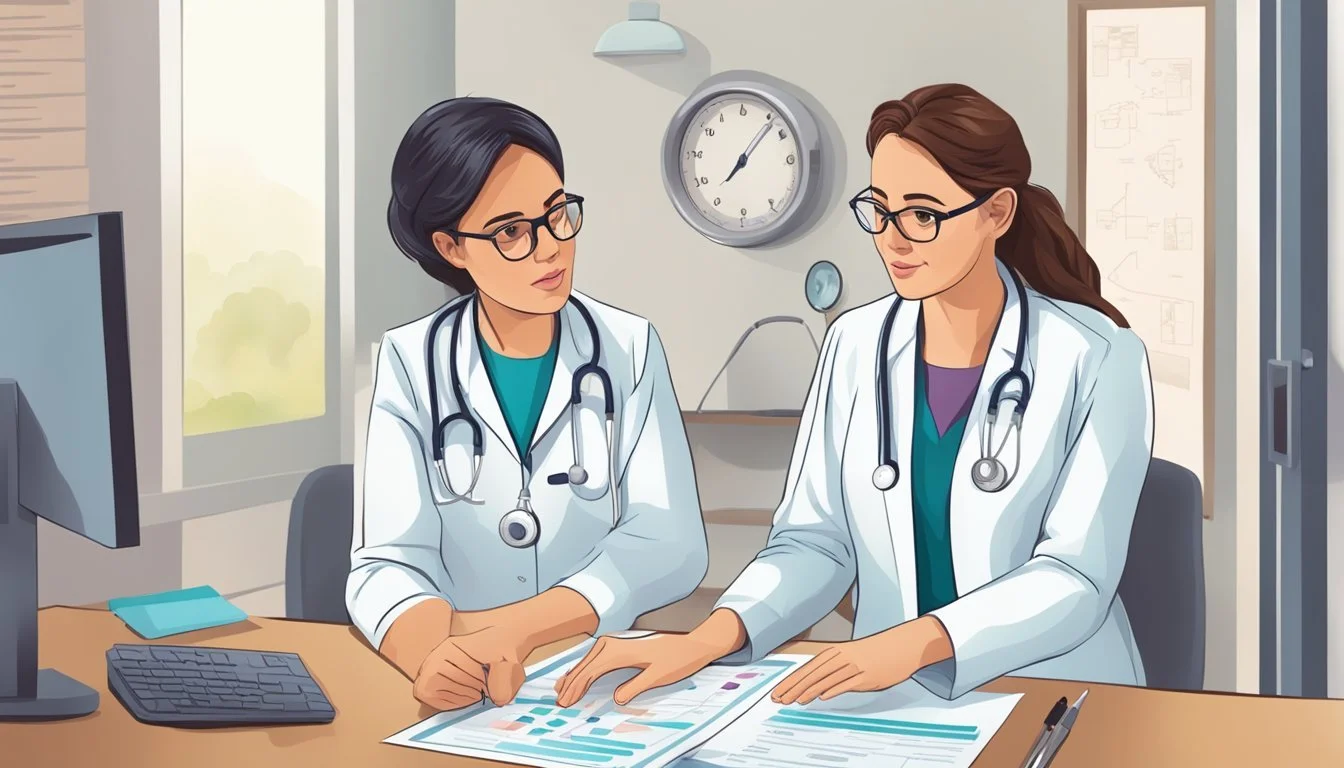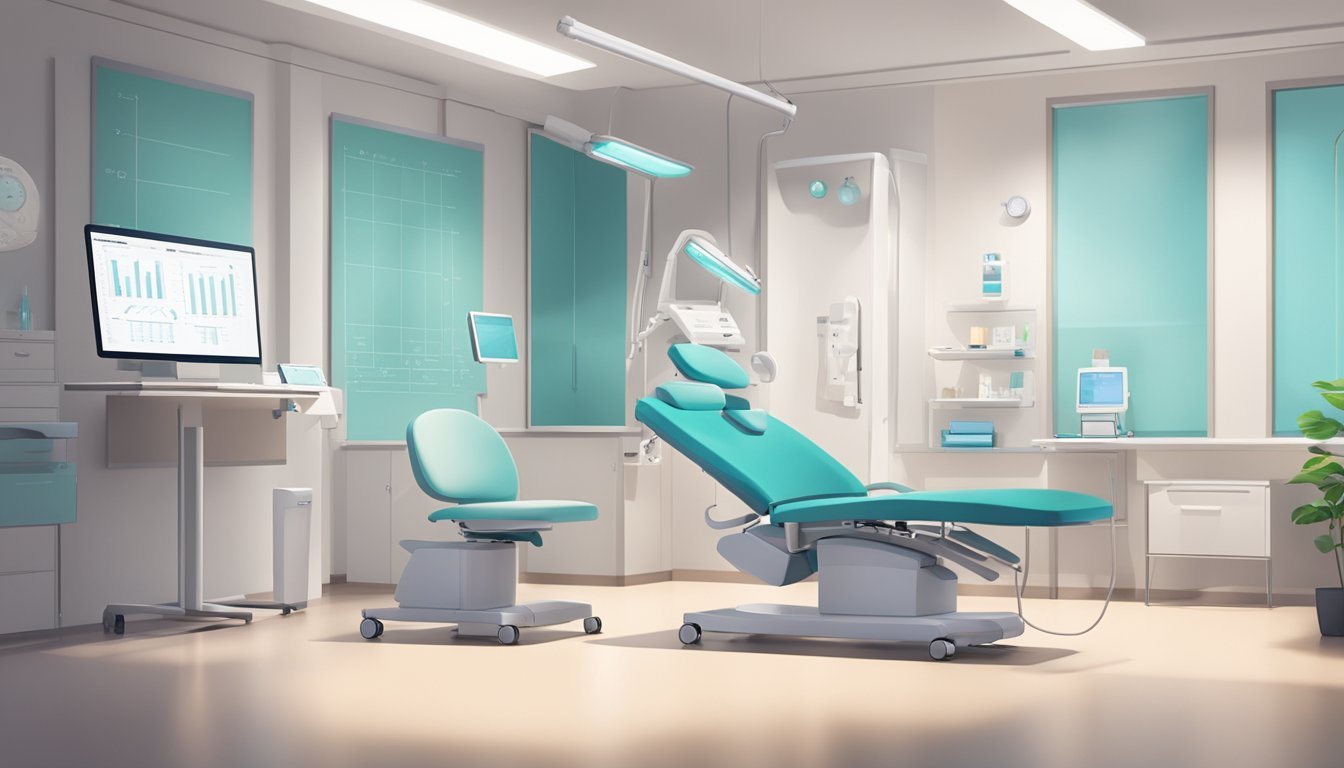Validating Menopausal Experiences: Confronting Gaslighting in Women's Genitourinary Health
Genitourinary symptoms of menopause are often misunderstood or dismissed, leading to a form of gaslighting experienced by many women. This phenomenon occurs when healthcare providers or others minimize, deny, or invalidate the real physical changes and discomfort associated with menopause.
Gaslighting of menopausal genitourinary symptoms can result in delayed diagnosis, inadequate treatment, and unnecessary suffering for affected women. These symptoms, which can include vaginal dryness, urinary issues, and sexual discomfort, are part of the genitourinary syndrome of menopause (GSM) that affects a significant percentage of postmenopausal women.
Recognizing and addressing this issue is crucial for improving women's health outcomes and quality of life during and after menopause. By raising awareness about the gaslighting of GSM symptoms, healthcare providers and patients can work together to ensure proper diagnosis, effective treatments, and better overall care for menopausal women.
Understanding Menopause
Menopause marks the end of a woman's reproductive years. It typically occurs between ages 45 and 55, with the average age being 51 in the United States.
The transition to menopause is characterized by fluctuating hormone levels, particularly a decrease in estrogen production. This hormonal shift can lead to various physical and emotional changes.
Common symptoms of menopause include:
Hot flashes and night sweats (vasomotor symptoms)
Vaginal dryness
Mood changes
Sleep disturbances
Weight gain
Vasomotor symptoms affect up to 75% of menopausal women. These can significantly impact quality of life, disrupting sleep and daily activities.
Estrogen plays a crucial role in maintaining vaginal health, bone density, and cardiovascular function. Its decline during menopause can lead to genitourinary symptoms and increased health risks.
Many women experience a range of emotions during this transition. Some may feel relief at no longer needing to worry about pregnancy, while others may struggle with the changes.
Healthcare providers can offer various treatment options to manage menopausal symptoms. These may include hormone therapy, lifestyle modifications, and non-hormonal medications.
Understanding menopause empowers women to make informed decisions about their health and well-being during this natural life stage.
Overview of Genitourinary Syndrome of Menopause (GSM)
Genitourinary Syndrome of Menopause (GSM) encompasses a range of symptoms affecting the genital and urinary systems in postmenopausal women. This condition impacts both physical health and quality of life.
Defining GSM
GSM refers to the collection of symptoms and signs resulting from estrogen deficiency in the female genitourinary tract. The term was introduced in 2014, replacing previous descriptors like vulvovaginal atrophy and atrophic vaginitis.
GSM affects the vulva, vagina, urethra, and bladder. Common symptoms include:
Vaginal dryness
Painful intercourse
Urinary urgency
Recurrent urinary tract infections
These symptoms are chronic and progressive, often worsening over time without treatment.
Prevalence and Impact
GSM is highly prevalent among postmenopausal women. Studies indicate that 27% to 84% of women experience GSM symptoms after menopause.
The condition can significantly impact a woman's:
Urinary function
Overall well-being
Many women with GSM report decreased quality of life and relationship difficulties. Despite its prevalence, GSM often goes undiagnosed and untreated due to embarrassment or lack of awareness.
Early recognition and management of GSM can help improve symptoms and prevent complications. Healthcare providers play a crucial role in identifying and addressing this common menopausal condition.
Symptoms of GSM
Genitourinary syndrome of menopause (GSM) causes a range of symptoms affecting the vulva, vagina, and urinary tract. These symptoms can significantly impact quality of life and intimate relationships.
Vulvovaginal Symptoms
Vulvovaginal atrophy is a hallmark of GSM. The vaginal walls become thinner, less elastic, and more fragile. This leads to vaginal dryness, itching, and burning sensations. Many women experience pain or discomfort during sexual intercourse, known as dyspareunia.
The vulva may appear pale and thin. Some women notice a loss of pubic hair. Decreased lubrication can make sexual activity uncomfortable or painful. Vaginal discharge may change in amount, color, or odor.
Vaginal infections become more common due to changes in the vaginal pH. Some women report feeling pressure or fullness in the pelvic area.
Urinary Tract Symptoms
GSM affects the urinary system as well. Women may experience urinary urgency, feeling a sudden need to urinate. Frequent urination, especially at night, is common.
Urinary incontinence can occur, with leakage of urine during coughing, sneezing, or physical activity. Some women have difficulty fully emptying their bladder.
Recurrent urinary tract infections (UTIs) are more likely due to changes in urinary pH and vaginal flora. UTIs may cause burning with urination and pelvic pain.
Urethral discomfort or pain may occur. Some women report a sensation of pressure in the lower abdomen or pelvic area.
Causative Factors of GSM
Genitourinary Syndrome of Menopause (GSM) stems primarily from hormonal changes during menopause, with estrogen deficiency playing a central role. Other factors can also contribute to the development and severity of symptoms.
Role of Estrogen
Estrogen is crucial for maintaining the health of genitourinary tissues. As estrogen levels decline during menopause, significant changes occur in these areas. The vaginal walls become thinner, less elastic, and more prone to irritation. Blood flow decreases, leading to reduced lubrication and slower healing.
Urinary tract tissues also rely on estrogen for proper function. The lack of this hormone can weaken the bladder and urethra, potentially causing urinary symptoms associated with GSM.
The vulva may become more sensitive and prone to discomfort due to estrogen deficiency. This can lead to itching, burning sensations, and pain during intercourse.
Other Contributing Factors
While estrogen deficiency is the primary cause of GSM, other factors can exacerbate symptoms. Age-related changes in tissue structure and function play a role, independent of hormonal status.
Certain medications, such as some antidepressants or cancer treatments, can affect genitourinary health. Chronic health conditions, including diabetes and autoimmune disorders, may impact tissue integrity and function.
Lifestyle factors also influence GSM severity. Smoking can reduce blood flow to tissues, worsening symptoms. Lack of sexual activity may lead to further thinning of vaginal tissues.
Stress and psychological factors can contribute to GSM symptoms, particularly in relation to sexual function and urinary issues.
Diagnosing GSM
Accurate diagnosis of Genitourinary Syndrome of Menopause (GSM) involves a comprehensive clinical assessment and specific diagnostic tools. Healthcare providers use a combination of patient history, physical examination, and laboratory tests to confirm the condition.
Clinical Assessment
A thorough clinical assessment is crucial for diagnosing GSM. Gynecologists typically begin by taking a detailed medical history, focusing on menopausal status and specific symptoms. Common signs include vaginal dryness, burning, itching, and pain during intercourse. Urinary symptoms like frequency, urgency, and recurrent infections are also noted.
Physical examination involves assessing the vulva, vagina, and pelvic floor for signs of atrophy. The provider checks for:
Thinning and paleness of vaginal tissues
Loss of elasticity and flexibility
Decreased vaginal lubrication
Shortening and narrowing of the vaginal canal
Diagnostic Tools
Several diagnostic tools aid in confirming GSM:
Vaginal pH testing: Normal vaginal pH is 3.5-4.5. In GSM, it often rises above 5.0.
Vaginal Maturation Index (VMI): This microscopic examination assesses the proportion of different types of vaginal epithelial cells. A low VMI indicates vaginal atrophy.
Urinalysis: To rule out urinary tract infections and assess for signs of atrophy in the urinary system.
Pelvic ultrasound: May be used to evaluate vaginal wall thickness and rule out other pelvic conditions.
These tools, combined with clinical assessment, help healthcare providers accurately diagnose GSM and develop appropriate treatment plans.
Treatment Options for GSM
Effective treatments are available to address the symptoms of genitourinary syndrome of menopause (GSM). These options range from hormonal therapies to non-hormonal alternatives and complementary approaches.
Hormonal Therapies
Vaginal estrogen therapy is a primary treatment for GSM. It comes in various forms such as creams, tablets, and rings. These deliver low doses of estrogen directly to vaginal tissues, improving symptoms with minimal systemic absorption.
Topical vaginal estrogen can help restore vaginal pH, increase blood flow, and improve tissue elasticity. This often leads to reduced dryness, irritation, and pain during intercourse.
For women who cannot use estrogen, vaginal DHEA suppositories offer an alternative. DHEA is converted to estrogen in vaginal tissues, providing localized benefits.
Non-Hormonal Therapies
Vaginal moisturizers are applied regularly to hydrate tissues and improve comfort. They work by binding to vaginal walls, releasing water and providing longer-lasting relief than lubricants.
Water or silicone-based lubricants can reduce friction during sexual activity. These products do not treat the underlying condition but can significantly improve comfort during intercourse.
Some women find relief with hyaluronic acid gels. These products aim to improve tissue hydration and elasticity without hormonal effects.
Alternative and Adjunct Treatments
Pelvic floor exercises can strengthen muscles supporting pelvic organs. This may improve urinary symptoms and sexual function in some women with GSM.
Laser and radiofrequency treatments are emerging options. These aim to stimulate collagen production and improve vaginal tissue health. However, long-term safety and efficacy data are still limited.
Some women explore plant-based therapies like phytoestrogens. While popular, scientific evidence for their effectiveness in treating GSM is mixed.
Lifestyle modifications, such as quitting smoking and maintaining a healthy weight, can complement other treatments and improve overall vaginal health.
Psychological Impact and Sexual Function
Genitourinary syndrome of menopause (GSM) can significantly affect a woman's psychological well-being and sexual function. The physical symptoms often lead to emotional and relational challenges.
Sexual Desire and Arousal
GSM frequently causes a decrease in sexual desire and arousal. Vaginal dryness and discomfort during intercourse can make sexual activity painful, leading to avoidance behaviors. Many women report a loss of libido due to these physical changes.
Reduced estrogen levels can also affect genital sensitivity, making it harder to achieve arousal. This can result in longer arousal times and decreased lubrication, further complicating sexual interactions.
Some women experience changes in orgasm intensity or frequency. These issues can strain intimate relationships and erode sexual confidence.
Psychological Consequences of GSM
The impact of GSM extends beyond physical discomfort, affecting mental health and self-image. Many women feel less feminine or attractive due to GSM symptoms, leading to decreased self-esteem.
Anxiety about sexual performance or pain during intercourse is common. This stress can create a cycle of tension and discomfort that further exacerbates symptoms.
Depression rates are higher among women with GSM. The condition can lead to social isolation and relationship difficulties, negatively impacting overall quality of life.
Some women report feelings of frustration or anger due to the changes in their bodies and sexual function. These emotions can contribute to mood disturbances and relationship tension.
Gaslighting Related to GSM Symptoms
Gaslighting of genitourinary syndrome of menopause (GSM) symptoms can significantly impact women's health and well-being. This harmful practice dismisses or trivializes the very real physical and emotional effects of GSM.
Recognizing Gaslighting
Gaslighting of GSM symptoms often manifests as dismissive attitudes from healthcare providers or loved ones. Women may hear statements like "It's all in your head" or "You're just getting older" when discussing vaginal dryness, discomfort, or urinary issues. This invalidation can lead to self-doubt and delayed treatment.
Some common signs of gaslighting include:
Minimizing the severity of symptoms
Suggesting menopausal women should simply "deal with it"
Implying that GSM symptoms are not a medical concern
Women experiencing GSM may face criticism for seeking help, being told they're overreacting or being too sensitive.
Addressing the Issue
Combating gaslighting requires education and advocacy. Women should arm themselves with accurate information about GSM and its symptoms. Keeping a symptom diary can provide concrete evidence to share with healthcare providers.
Seeking second opinions from menopause specialists or urogynecologists can be helpful. These experts are more likely to recognize and validate GSM symptoms.
Support groups and online communities offer safe spaces for women to share experiences and find validation. Encouraging open conversations about menopause and GSM can help reduce stigma and increase awareness.
Healthcare providers play a crucial role in addressing gaslighting. Continuing education on GSM and its impact is essential. Listening to patients with empathy and taking their concerns seriously can make a significant difference in diagnosis and treatment.
Lifestyle and Preventive Measures
Regular exercise can help alleviate some symptoms of genitourinary syndrome of menopause (GSM). Engaging in pelvic floor exercises strengthens muscles that support the bladder and vagina.
Maintaining a healthy diet rich in phytoestrogens may provide some relief. Foods like soy, flaxseeds, and whole grains contain these plant-based compounds.
Quitting smoking is crucial for overall health and can improve GSM symptoms. Smoking negatively affects estrogen levels and blood circulation to the genital area.
Staying sexually active can help maintain vaginal health. Regular sexual activity or use of vaginal dilators promotes blood flow and elasticity of vaginal tissues.
Proper hydration is essential. Drinking adequate water throughout the day supports urinary tract health and may reduce irritation.
Using a water-based lubricant during intercourse can ease discomfort and prevent further irritation of sensitive tissues.
Avoiding irritants like scented soaps, douches, and tight synthetic clothing can help prevent exacerbation of symptoms.
Stress reduction techniques such as yoga or meditation may help manage some GSM symptoms by promoting relaxation and improving overall well-being.
Regular check-ups with a healthcare provider are important for early detection and management of GSM symptoms.
Advanced Treatments and Therapies
Novel approaches to managing genitourinary syndrome of menopause (GSM) have emerged in recent years. These innovative therapies aim to provide effective relief for women experiencing distressing symptoms.
Laser Therapy and Innovations
Laser therapy represents a significant advancement in GSM treatment. This non-hormonal option uses fractional CO2 or Er lasers to stimulate collagen production and improve vaginal tissue health. Clinical studies have shown promising results in reducing vaginal dryness and dyspareunia.
Patients typically undergo 3-4 treatment sessions spaced 4-6 weeks apart. The procedure is generally well-tolerated, with minimal discomfort and downtime. However, long-term safety data is still limited.
Other innovative treatments include radiofrequency devices and energy-based technologies. These methods aim to improve vaginal elasticity and lubrication through tissue remodeling.
Emerging Pharmacologic Treatments
New pharmacologic options are expanding the treatment landscape for GSM. Ospemifene, an oral selective estrogen receptor modulator (SERM), has shown efficacy in treating vaginal dryness and painful intercourse. It offers an alternative for women who cannot use vaginal estrogen.
Intravaginal dehydroepiandrosterone (DHEA) has gained attention as a hormone precursor therapy. It helps restore vaginal tissue without significantly increasing systemic estrogen levels.
Ongoing research is exploring novel compounds and delivery methods. These include tissue-selective estrogen complexes and vaginal rings with sustained-release formulations.
Evidence from clinical trials supports the efficacy of these emerging treatments. However, individualized approaches based on patient preferences and medical history remain crucial in managing GSM symptoms.
Navigating Cancer and GSM
Cancer survivors face unique challenges when managing genitourinary syndrome of menopause (GSM). Treatment options must be carefully evaluated to ensure safety and effectiveness.
Concerns for Breast Cancer Survivors
Breast cancer survivors often experience severe GSM symptoms due to anti-estrogen therapies. These treatments can induce early menopause or exacerbate existing symptoms. Many women report vaginal dryness, pain during intercourse, and urinary issues.
Oncologists may hesitate to recommend estrogen-based therapies for GSM. This caution stems from concerns about potential cancer recurrence. However, recent studies suggest low-dose vaginal estrogen may be safe for some breast cancer survivors.
It's crucial for patients to discuss their symptoms openly with healthcare providers. A multidisciplinary approach involving oncologists and menopause specialists can help develop tailored treatment plans.
GSM Treatments and Cancer Risks
When selecting GSM treatments for cancer survivors, safety is paramount. Non-hormonal options like moisturizers and lubricants are generally considered safe. These can provide relief for mild symptoms without systemic effects.
For more severe cases, low-dose vaginal estrogen may be considered. This treatment delivers localized relief with minimal systemic absorption. However, it's not suitable for all patients, especially those with estrogen-receptor-positive cancers.
Alternative treatments include:
Vaginal DHEA
CO2 laser therapy
Ospemifene (for non-breast cancer survivors)
Each option carries its own risk profile. Patients and doctors must weigh potential benefits against risks, considering individual health history and cancer type.
Regular follow-ups are essential to monitor treatment efficacy and detect any adverse effects promptly.
Patient Education and Advocacy
Patient education and self-advocacy are crucial for addressing genitourinary syndrome of menopause (GSM). Providing accurate information and empowering patients to speak up about their symptoms can lead to better diagnosis and treatment outcomes.
Educating Patients on GSM
Doctors play a vital role in educating patients about GSM. They should explain that GSM affects up to 84% of postmenopausal women and can significantly impact quality of life. Patients need to understand that GSM is a chronic condition requiring ongoing management.
Healthcare providers should discuss common symptoms like vaginal dryness, burning, and urinary issues. They should emphasize that these symptoms are normal and treatable, not something to be ashamed of or ignored.
Educational materials like brochures or online resources can supplement in-person discussions. These tools can help patients recognize GSM symptoms and understand available treatment options.
Empowering Self-Advocacy
Self-advocacy is essential for proper GSM management. Patients should be encouraged to track their symptoms and communicate openly with healthcare providers. This can lead to earlier diagnosis and more effective treatment.
Women should feel empowered to:
Speak up about uncomfortable or painful symptoms
Ask questions about treatment options
Seek second opinions if needed
Discuss the impact of GSM on their relationships and quality of life
Support groups can provide a safe space for women to share experiences and learn self-advocacy skills. Online forums and local meetups can connect patients with others facing similar challenges.
Healthcare providers can foster self-advocacy by creating a judgment-free environment and actively listening to patients' concerns. This approach helps build trust and encourages open communication about sensitive GSM symptoms.
References and Further Reading
Portman, D.J., & Gass, M.L.S. (2014). Genitourinary syndrome of menopause: New terminology for vulvovaginal atrophy from the International Society for the Study of Women's Sexual Health and the North American Menopause Society. Menopause, 21(10), 1063-1068.
Nappi, R.E., & Kokot-Kierepa, M. (2012). Vaginal Health: Insights, Views & Attitudes (VIVA) - results from an international survey. Climacteric, 15(1), 36-44.
Kingsberg, S.A., et al. (2017). Vulvar and vaginal atrophy in postmenopausal women: Findings from the REVIVE (REal Women's VIews of Treatment Options for Menopausal Vaginal ChangEs) survey. The Journal of Sexual Medicine, 14(3), 387-395.
Stuenkel, C.A., et al. (2015). Treatment of symptoms of the menopause: An Endocrine Society clinical practice guideline. The Journal of Clinical Endocrinology & Metabolism, 100(11), 3975-4011.
Gandhi, J., et al. (2016). The role of estrogen in female urogenital health: A comprehensive review. Maturitas, 94, 63-72.
These references provide comprehensive information on genitourinary syndrome of menopause, its prevalence, and treatment options. They offer insights into women's experiences and the latest clinical guidelines for managing menopausal symptoms.






